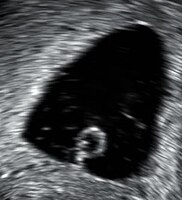
Photo from wikipedia
Objective To investigate the association between pre-pregnancy body mass index (BMI) and miscarriages in women who required assisted reproductive technology (ART) for conception. Methods A retrospective cohort study was conducted… Click to show full abstract
Objective To investigate the association between pre-pregnancy body mass index (BMI) and miscarriages in women who required assisted reproductive technology (ART) for conception. Methods A retrospective cohort study was conducted using a 10-year (2006–2015) sample of 14,994 pregnancy cycles with ART treatment in Northwest Women’s and Children’s Hospital, Xi’an, China. The effects of women’s BMI before pregnancy on early miscarriage and miscarriage were assessed using generalized estimating equation models. Results The risks of early miscarriage and miscarriage were higher in the obese group than in the normal weight group [early miscarriage: relative risk (RR) = 1.36, confidence interval (CI): 1.12–1.65; miscarriage: RR = 1.40, 95% CI: 1.17–1.68]. Pre-pregnancy underweight was not associated with an increased risk of early miscarriage or miscarriage. We observed interactions between pre-pregnancy BMI and singleton or twin pregnancy in early miscarriage and miscarriage (P = 0.017 and P = 0.003, respectively). Twin pregnancy increased the effects of pre-pregnancy BMI on early miscarriage and miscarriage (early miscarriage: a. singleton pregnancy: RR = 1.02, 95% CI: 1.01–1.04; b. twin pregnancy: RR = 1.08, 95% CI: 1.03–1.13; miscarriage: a. singleton pregnancy: RR = 1.02, 95% CI: 1.01–1.04; b. twin pregnancy: RR = 1.08, 95% CI: 1.05–1.13). Conclusions Pre-pregnancy obesity was associated with higher risks of early miscarriage and miscarriage in the ART population, and twin pregnancy increased the effects of pre-pregnancy BMI on early miscarriage and miscarriage. Women should maintain a normal BMI before ART initiation to prevent adverse pregnancy outcomes.
Journal Title: Frontiers in Endocrinology
Year Published: 2021
Link to full text (if available)
Share on Social Media: Sign Up to like & get
recommendations!